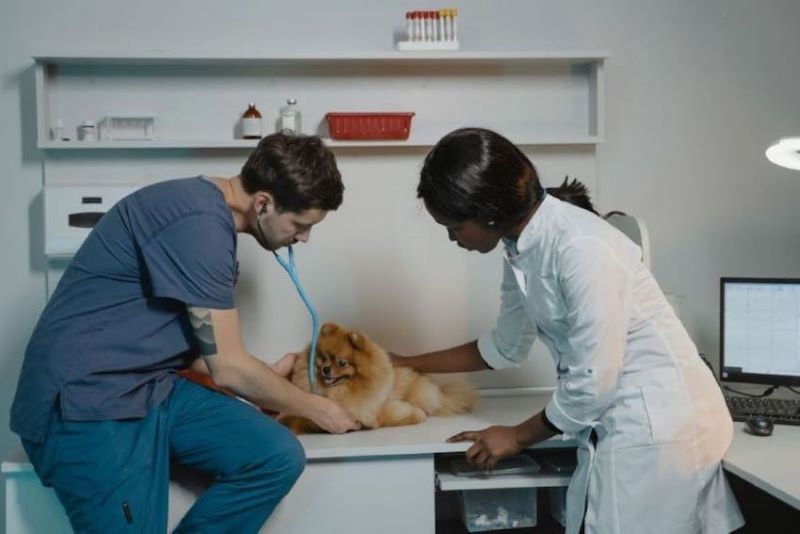Ready to help treat your pet to a healthy life?
Kidney Failure in Dogs — What it is, Causes & Treatment
By : Trupanion Staff | Updated Feb 21, 2024

As with humans, dogs rely on their kidneys to filter waste from their systems. These important organs work every day to cleanse the blood and assist with the removal unnecessary or even harmful substances from the body. When your dog's kidneys malfunction and are not performing as they should, your pet can be diagnosed with kidney failure.
In order to properly understand the risks and your pet's options for treatment, it's important to have an honest discussion with your dog's veterinarian. In the meantime, this guide can help shed some light on what happens in canine kidney failure and the different outcomes that can result.
What is kidney failure in dogs?
Kidney failure is defined by the kidneys' inability to effectively remove waste from blood. This waste builds up resulting in uremia and symptoms of kidney failure. Kidney failure can occur suddenly or gradually over time.
- Acute kidney failure: Acute kidney failure has a sudden onset. If diagnosed quickly and treated aggressively it is potentially reversible.
- Chronic kidney failure: Chronic kidney failure is the slow decline in the ability of the kidneys to eliminate waste from a dog’s body. The condition is incurable, but it can be managed with treatment. This is more common than acute kidney failure.
Causes of canine kidney failure
- Environment factors. Exposure to certain toxins and chemicals, such as antifreeze, pesticides, and certain medications, can all damage dogs' kidneys, sometimes quite rapidly.
- Ureteral obstruction. Most commonly caused by a urolith (urinary stone) that results in restriction of urine flow.
- Lyme disease. This disease is carried by ticks and can result in chronic kidney failure for dogs.
- Heart conditions. These conditions can reduce blood flow to the kidneys, which results in failure.
- Hereditary and congenital conditions. Your vet will warn you if a condition your dog has been diagnosed with has the potential to cause kidney failure. You can then be aware of the symptoms should they develop.
- Aging. Sometimes, chronic kidney failure is idiopathic, and may be part of the natural aging process.

7 signs of kidney failure in dogs
If you notice any of the signs of canine kidney failure listed below, schedule an appointment with your dog's veterinarian as soon as possible. While kidney failure is a progressive condition, fast intervention and treatment is key to survival.
1. Increased thirst
Dogs suffering from kidney problems may find themselves extra thirsty or feeling dehydrated. Because of this you will usually see your dog drinking more, or notice you are having to refill their water bowl more frequently than usual.
2. Increased urination or 'accidents'
It might be worth keeping a note of how often you have to let your dog out to urinate. If this seems excessive, it’s a cause for concern. If your older, house-trained dog is suddenly having accidents in the house, kidney problems may be to blame.
3. Decreased urination
On the flip side, kidney problems can also lead to less urination than usual. You may notice your pet is urinating in smaller amounts or posturing without anything actually coming up. If your dog is rarely urinating or not doing so at all, seek emergency veterinary care right away — the inability to urinate is serious and can indicate a variety of other serious health conditions in addition to kidney failure.
4. Lethargy
Lethargy in and of itself is concerning and can indicate a wide range of health problems in dogs. In conjunction with any of the other signs of canine kidney failure on this list, however, lethargy can be extra indicative of renal issues.
5. Bad breath
Among other things this could be indicative of kidney issues. Breath associated with kidney failure can smell like ammonia, must, or sweat. Some pet owners have also likened it to a fishy scent.
6. Decreased appetite
When a dog’s kidneys fail, toxins such as ammonia and nitrogen can build up in their bodies. This, in turn, can cause nausea, vomiting, and/or a decreased appetite. This condition is known as uremia, and it is directly related to kidney failure.
7. Other uremia symptoms
Your dog may not be able to tell you how they feel, but it's time to call the vet if you notice signs like unexplained weight loss, diarrhea, and weakness.
Diagnosing renal failure in dogs
Diagnosing kidney failure in dogs involves a range of diagnostic tests and procedures that help veterinarians identify the condition accurately. Early detection is crucial in managing kidney failure and providing the best possible care for our furry friends.
Tests play the most vital role in confirming kidney failure and determining the severity of your dog's condition. One commonly used test is a blood chemistry panel, which measures various substances in the blood, including creatinine and blood urea nitrogen (BUN) levels. Elevated levels of these substances indicate impaired kidney function. Urinalysis meanwhile helps evaluate the urine's concentration, presence of protein or blood, and specific gravity, all of which provide valuable insights into your dog's renal health.
In some cases, your pet's veterinarian may recommend further diagnostic procedures to gain a comprehensive understanding of the dog's kidney function. These may include ultrasound imaging to assess the size, shape, and structure of the kidneys, as well as to detect any abnormalities or blockages. A kidney biopsy may also be performed, involving the removal of a small tissue sample for microscopic examination. This procedure helps identify the specific cause of kidney failure, such as chronic inflammation or certain diseases.
Again, early detection of kidney failure is crucial for initiating appropriate treatment and preventing your dog's condition from deteriorating further. As kidney disease often progresses gradually, it is essential to monitor dogs regularly, especially if they are at a higher risk due to age, breed predisposition, or underlying health conditions. Routine blood and urine tests can help identify early signs of kidney dysfunction, allowing veterinarians to intervene promptly and implement necessary lifestyle changes, medications, or therapeutic diets.
Canine kidney failure treatment options
When it comes to managing kidney failure in dogs, a combination of medical and dietary interventions is typically recommended. The goal is to slow down the progression of the disease, alleviate symptoms, and maintain the overall well-being of your furry friend.
Acute kidney failure treatment includes addressing the underlying cause, if known. For example, antibiotics are used for an infection or specific antidotes may be available in cases of accidental poisoning. The kidneys may be supported using dialysis, which helps to remove toxins from the blood. Without treatment, acute kidney failure is fatal.
Chronic kidney failure is treated primarily through changes in diet, fluid therapy, and various medications on an outpatient basis. Chronic kidney failure is considered terminal, but not immediately fatal. For dogs, chronic kidney failure tends to progress over months to years.

What can I do to prevent kidney failure in my dog?
You can't predict whether or not your dog will experience failing kidneys or other canine renal problems. However, there are a few things you can do to help prevent these issues:
- Ensure that your dog drinks plenty of water, especially if they have been physically active.
- Restrict access to toxins by keeping all chemicals and medicines out of reach and avoiding pesticide-treated areas.
- Don't skip vet visits! Regular veterinary exams and lab work are important for early detection, especially in older or high-risk dogs.
- Do not breed dogs with hereditary causes of kidney failure.
Cases of renal failure in dogs vary from pet to pet and can have wildly different outcomes. Prevention and staying on top of early detection will go a long way in helping your dog, but at the end of the day it is impossible to predict which dogs will experience kidney failure and which will not. If you notice any of the symptoms of canine kidney failure described in this guide, seek veterinary care for your pet as soon as possible. And if you haven't done so already, protect your dog's health with a good pet insurance plan now before any unwelcome surprises occur.
